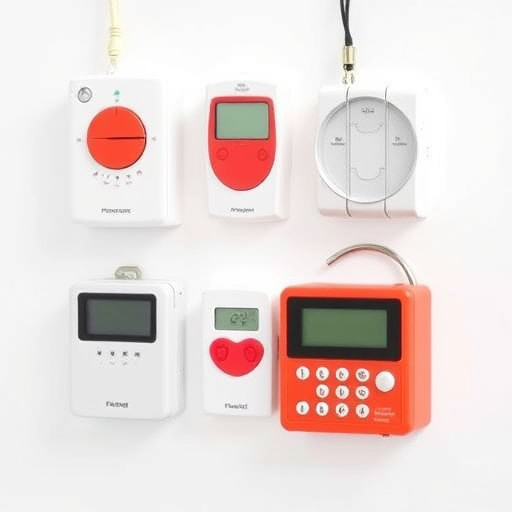Night walkers face risks like poor visibility, hazardous roads, and threats. Reflectives and flashlights enhance safety. Personal alarms with 120+ dB decibel levels deter danger and alert help. Choose water-resistant devices with long sound duration. Adhere to local noise laws for responsible usage. Advanced GPS tracking and fall detection offer added security. Modern personal alarms with high decibel levels and smart tech ensure swift response times, making them indispensable for night walkers.
Night walking can present unique risks, from poorly lit paths to potential hazards. Understanding these dangers is the first step toward ensuring safe evening walks. This article explores essential emergency safety devices designed to protect you after sunset. From personal alarms to smart features, we delve into the best practices for enhancing your night-time security. Discover the safest decibel level for protection and learn about various effective night safety devices to keep you secure during your late-night strolls.
- Understanding Night Walking Risks
- The Role of Personal Alarms
- Safest Decibel Level for Protection
- Types of Effective Night Safety Devices
- Enhancing Safety with Smart Features
Understanding Night Walking Risks
Night walking, while offering a serene experience for some, comes with unique risks that often go overlooked. As visibility decreases, potential dangers such as unexpected obstacles, hazardous road conditions, or even risky encounters increase. Understanding these risks is the first step in ensuring safe night walks.
One key aspect to consider is maintaining awareness and visibility. Wearing reflective clothing and carrying a powerful flashlight can significantly enhance your presence to others. Additionally, understanding the safest decibel level for personal alarms is crucial. A loud, piercing sound can startle potential threats and alert nearby friends or authorities, making personal alarms an effective self-defense mechanism. Opting for a personal alarm with a recommended decibel level of 120 dB or higher ensures its effectiveness in attracting attention quickly.
The Role of Personal Alarms
Personal alarms play a pivotal role in enhancing safety during night walks. These compact yet powerful devices are designed to emit loud sounds, ensuring maximum visibility and deterring potential threats. The safest decibel level for personal alarms typically ranges between 105 and 120 decibels (dB), which is above the pain threshold of the human ear, making them highly effective in startling assailants and drawing attention to one’s location.
When selecting a personal alarm, consider factors like duration of the sound, ease of carry, and water resistance. Longer-lasting alarms offer more time for assistance, while compact designs make them convenient for night walks. Remember, the loudest alarm is only effective if it can be heard; ensure you choose a device that meets the safest decibel level recommendations for optimal protection.
Safest Decibel Level for Protection
The safest decibel level for protection against potential dangers while night walking is a topic of interest, especially when considering personal alarm devices. While high-decibel sounds can startle and deter potential threats, it’s crucial to understand that excessive noise can also be harmful to one’s hearing. Personal alarms designed for outdoor use typically range from 120 to 140 decibels (dB). This range offers an effective balance between loud enough to startle a potential assailant or wild animal and safe enough not to cause permanent damage to the user’s ears.
Choosing a personal alarm with a decibel level within this range ensures both effectiveness and safety. It’s important to note that while these devices can be lifesavers, they should be used responsibly. Users should familiarize themselves with local laws regarding noise levels in public spaces to avoid disturbing neighbors or causing unnecessary alarm.
Types of Effective Night Safety Devices
When venturing out for night walks, ensuring safety should be your top priority. There are various emergency safety devices designed to protect and alert you during low-light conditions. One of the most effective tools is a personal alarm, which can emit the safest decibel level to deter potential threats. These alarms are compact, easy to carry, and can quickly attract attention with loud, piercing sounds.
Additionally, advanced technology offers GPS tracking devices that can be attached to your person or belongings. These gadgets allow you to stay connected and enable loved ones to monitor your location in case of emergencies. Some devices even include automatic fall detection, providing an extra layer of security during night walks.
Enhancing Safety with Smart Features
Emergency safety devices designed for night walking have evolved significantly, incorporating smart features that enhance user protection and peace of mind. One such device is the personal alarm, which now often includes GPS tracking, automatic fall detection, and remote activation by emergency contacts. These advanced functions ensure that help can be dispatched promptly if needed, even in remote areas.
Additionally, personal alarms are equipped with the safest decibel levels, capable of reaching 120 decibels or more, making them loud enough to startle potential threats while also ensuring user safety. This combination of technology and loudness makes modern emergency safety devices indispensable tools for night walkers, providing an extra layer of protection during their journeys in low-light conditions.
When navigating the risks associated with night walking, incorporating emergency safety devices is a proactive step towards ensuring your well-being. After understanding the potential dangers and exploring options like personal alarms, choosing the right device becomes crucial. Aim for products that offer the safest decibel level for maximum protection. Consider smart features that enhance safety, providing peace of mind during your evening walks. Remember, a well-equipped individual is better prepared to handle unexpected situations.
